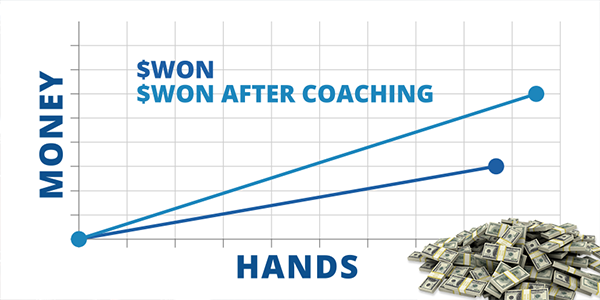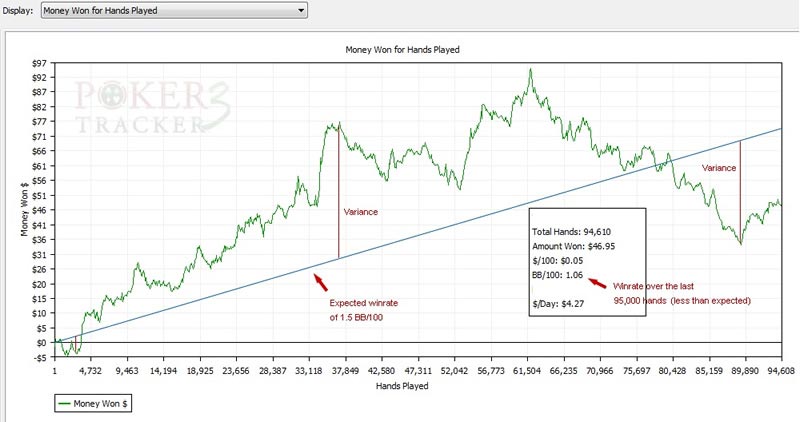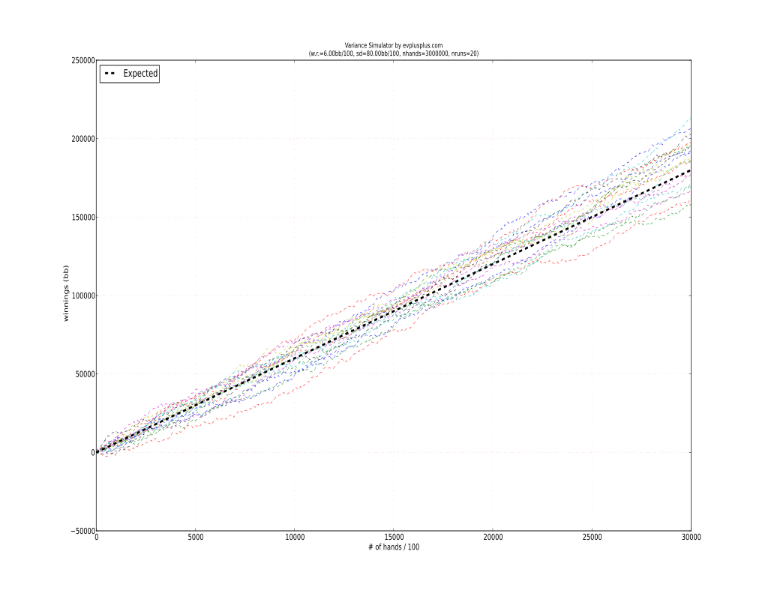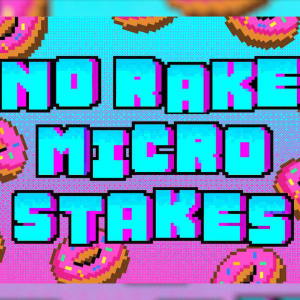
There are many misconceptions about the role of luck in poker. A Large percentage of average bread eaters are still unaware that poker is a game of skill. Some recreational players are unable to see past the short run and confuse small edges with blind luck or even foul play. The internet is full of rigged software theories.
Variance Simulation
 Let me introduce you to Eddie. Eddie is a very special poker player. He has 19 identical clones and perfect information about his 3bb/100 6-max no-limit Hold'em win rate. He decided to use his special circumstances to conduct the experiment that could prove valuable for the entire poker community (and net him a bit of cash in the process).
Let me introduce you to Eddie. Eddie is a very special poker player. He has 19 identical clones and perfect information about his 3bb/100 6-max no-limit Hold'em win rate. He decided to use his special circumstances to conduct the experiment that could prove valuable for the entire poker community (and net him a bit of cash in the process). Eddie and his identical clones decided to play a number of hands that an average poker player might play in one lifetime and settled on 3 million. Some serious grinders can hit that mark in less than 2 years, but others won't get anywhere close to 3 million even if they play a respectable amount of hands per month like 30k or 50k. Here are the results of the experiment:


3bb/100 isn't a mind-blowing win rate by any stretch of the imagination, but it can be very respectable especially once you move up in stakes or if you prioritize volume over education. It's scary to think that the career of a solid winner can sometimes prematurely end because of the unlucky 400k hands long downswing. In the end "the unlucky Eddie" powered through and after 3 million hands he finished fairly close to his actual 3bb/100 win rate.
Misconceptions

- We can't ever know our actual win rate. We can try to estimate it based on adequate sample size (200k is probably a reasonable minimum, but it will still give you results spanning about 4bb/100) and we should do that if poker is our main source of income, but we can't ever know for sure.
- Old 20-30 buy-in per limit bankroll management rule is extremely inflexible. It can work pretty well if you're a very good player with disposable income, but you should always base your bankroll management strategy on many different factors instead of blindly trusting some arbitrary rule of thumb.
- Losing - even for a long period of time - doesn't necessarily mean that you're a bad player (though the more and the longer you're losing the more likely it is).
- Winning - even for a long period of time - doesn't necessarily mean that you're a good player (though the more and the longer you're winning the more likely it is).
- You can't control variance. This isn't strictly true because standard deviation can actually be affected by your play style, but if you're trying to consciously make that happen there's a high chance you'll actually sabotage your win rate. Besides, Eddie's experiment assumed 80bb/100 standard deviation which is actually somewhat conservative (if your style is particularly aggressive 90bb/100 or even 100bb/100 would be more realistic for 6-max no-limit Hold'em). And after re-running this simulation for a standard deviation of 70bb/100, possible win rates still spanned about 1.5bb/100, longest downswing was still really severe (almost 90 buy-ins) and longest break-even stretch lasted more than 500k hands!
- There is no justice in poker, the math doesn't really concern itself with abstract terms. This doesn't make the concept of justice invalid (it might be hard or even impossible to build a functioning society without it) you just can't apply it to variance or luck. You can have the same level of skill as another player and still win (or lose) more money than him lifetime. This is especially important given the popularity of "Don't worry it's going to even out in the long run" advice.
Recipe for Success - Ignore What You Can't Control
 Life of a 3bb/100 winner is good for the most part. Sure it has its ups and downs and in some extremely unlikely cases it can get very hard, but since we can't really affect variance and we can't expect 'justice' when it comes to our results we should just accept our situation right? Well, yes and that acceptance can bring us some much-needed peace of mind.
Life of a 3bb/100 winner is good for the most part. Sure it has its ups and downs and in some extremely unlikely cases it can get very hard, but since we can't really affect variance and we can't expect 'justice' when it comes to our results we should just accept our situation right? Well, yes and that acceptance can bring us some much-needed peace of mind. However, there's still one variable that we should explore. It's actually the most important one and we have a good amount of control over it. It's - of course - our win rate. So far we just assumed that it's a static value and that's obviously not true for most players. We can improve by reading articles, watching videos, reviewing our hands, working with a study group etc. We can also decrease our win rate by neglecting education.

Other Top Recommended Content
If you enjoyed reading this article, check out our other top recommended articles!- Variables and Decision Making
- Big Blind Poker Strategy
- How to Win at Poker | Good Player vs Winning Player
- Leakfinder Review for MilfGrinder - 20NL Cash on Betfair
- 6 Tabling €50NL Cash on BetVictor
- Europe-Bet - Microstakes Cash Live 10NL - Part 1


